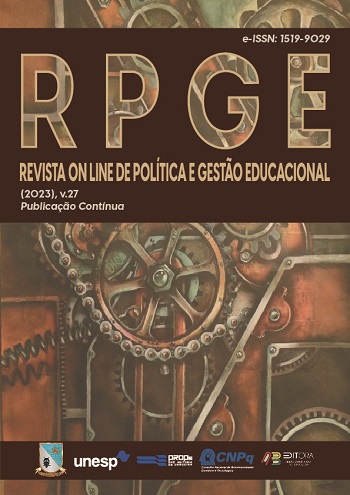Flipped classroom como uma tecnologia inovadora para a aprendizagem híbrida de inglês profissional em instituições de ensino superior
DOI:
https://doi.org/10.22633/rpge.v27i00.18526Palavras-chave:
Ensino híbrido, Inglês, Aula invertida, Estudantes, ProfessoresResumo
Este artigo fornece uma visão geral de uma pesquisa sobre o conceito de ensino híbrido e suas características e perspectivas de uso no ensino de inglês em instituições de ensino superior. O artigo apresenta os resultados de um experimento pedagógico envolvendo a integração do modelo flipped classroom no processo de aprendizado e demonstra sua eficácia no ensino de inglês profissional. Conclui-se que o uso do flipped classroom no ensino do curso “Inglês Profissional” pode se tornar uma ferramenta eficaz para o professor universitário. É importante integrá-lo ao processo educacional para garantir a prestação de serviços educacionais de qualidade, criar oportunidades reais para melhorar a formação profissional dos alunos, personalizar o processo educacional e alinhá-lo às necessidades de cada estudante, independentemente de seu nível inicial de formação.
Downloads
Referências
CHEN, J.; TAN, J.; LEI, J. Exploring learner identity in the blended learning context: A case study of collaborative writing. System, v. 108, 102841, 2022. DOI: 10.1016/j.system.2022.102841.
DANGNGUYEN, L. Management of educational accreditation in the context of an education innovation: Theoretical issues and requirements. Nuances: Estudos Sobre Educação, v. 33, n. 00, e022005, 2022. DOI: 10.32930/nuances.v33i00.9483.
DE BRITO LIMA, F.; LAUTERT, S. L.; GOMES, A. S. Contrasting levels of student engagement in blended and non-blended learning scenarios. Computers & Education, v. 172, 104241, 2021. DOI: 10.1016/j.compedu.2021.104241.
GASPARIAN, M. et al. Conceptual model of a smart integrated educational environment. Wisdom, v. 4, n. 3, p. 32–39, 2022. DOI: 10.24234/wisdom.v4i3.911.
GLADILINA, I. P. et al. Use of information and computer-based distance learning technologies during COVID-19 active restrictions. International Journal of Advanced Computer Science and Applications, v. 13, n. 6, n. 748–753, 2022. DOI: 10.14569/IJACSA.2022.0130688.
HARIADI, B. et al. Higher order thinking skills based learning outcomes improvement with blended web mobile learning model. International Journal of Instruction, v. 15, n. 2, p. 565–578, 2022. DOI: 10.29333/iji.2022.15231a.
HE, X.; SINGH, C. K. S.; EBRAHIM, N. A. Quantitative and qualitative analysis of higher-order thinking skills in blended learning. Perspektivy nauki i obrazovania [Perspectives of Science and Education], v. 59, n. 5, p. 397–414, 2022. DOI: 10.32744/pse.2022.4.23.
KRAVCHENKO, O. et al. Productivity in higher education institutions within digitalization. Interacción y Perspectiva, v. 11, n. 2, p. 154–169, 2021.
MEDESHOVA, А. et al. Distance learning activation in higher education. European Journal of Contemporary Education, v. 11, n. 3, p. 831–845, 2022. DOI: 10.13187/ejced.2022.3.831.
NIKIPORETS-TAKIGAWA, G.; SKORODUMOVA, O.; MELIKOV, I. New needs of Russian higher education in the digital age. Revista Conrado, v. 18, n. 88, p. 285–290, 2022.
ONG, A. K. S. et al. Preference analysis on the online learning attributes among senior high school students during the COVID-19 pandemic: A conjoint analysis approach. Evaluation and Program Planning, v. 92, 102100, 2022. DOI: 10.1016/j.evalprogplan.2022.102100.
PIVNEVA, S. et al. Raising the level of motivation of economics students for studying english using the Myenglishlab Blended Learning Platform. Revista Conrado, v. 19, n. 90, p. 270–276, 2023.
RAMAZANOVA, D. et al. Using Instagram to raise the effectiveness of distance learning in English: The experience of Kazakhstani students. Frontiers in Education, v. 7, 923507, 2022. DOI: 10.3389/feduc.2022.923507.
SOKOLOVSKAYA, I. E. et al. Educational and professional motivation of students with various religious orientations. European Journal of Science and Theology, v. 16, n. 4, p. 169–180, 2020.
TOGAIBAYEVA, A. et al. Effect of mobile learning on students’ satisfaction, perceived usefulness, and academic performance when learning a foreign language. Frontiers in Education, v. 7, 946102, 2022. DOI: 10.3389/feduc.2022.946102.
TOLMACHEV, M. et al. Development of students’ digital competence when using the “Oracle” electronic portal. European Journal of Contemporary Education, v. 11, n. 4, p. 1261–1270, 2022. DOI: 10.13187/ejced.2022.4.1261.
TONG, D. H.; UYEN, B. P.; NGAN, L. K. The effectiveness of blended learning on students' academic achievement, self-study skills and learning attitudes: A quasi-experiment study in teaching the conventions for coordinates in the plane. Heliyon, v. 8, n. 12, e12657, 2022. DOI: 10.1016/j.heliyon.2022.e12657.
TRUSS, A.; ANDERSON, V. The navigational challenges of a blended learning approach to teaching in business and management. The International Journal of Management Education, v. 21, n. 1, 100733, 2023. DOI: 10.1016/j.ijme.2022.100733.
YAKHAYEVA, A.; MUSKHANOVA, I. Dissemination of pedagogical practices to build the success of young teachers in Russia. Conhecimento & Diversidade, v. 13, n. 34, p. 303–309, 2022.
YAROSLAVOVA, E. N.; KOLEGOVA, I. A.; STAVTSEVA, I. V. Flipped classrom blended learning model for the development of students’ foreign language communicative competence. Perspektivy nauki i obrazovania [Perspectives of Science and Education], v. 43, n. 1, p. 399–412, 2020. DOI: 10.32744/pse.2020.1.29.
Downloads
Publicado
Como Citar
Edição
Seção
Licença
Copyright (c) 2023 Revista on line de Política e Gestão Educacional

Este trabalho está licenciado sob uma licença Creative Commons Attribution-NonCommercial-ShareAlike 4.0 International License.
Manuscritos aceitos e publicados são de propriedade da Revista on line de Política e Gestão Educacional. É vedada a submissão integral ou parcial do manuscrito a qualquer outro periódico. A responsabilidade do conteúdo dos artigos é exclusiva dos autores. É vedada a tradução para outro idioma sem a autorização escrita do Editor ouvida a Comissão Editorial Científica.











